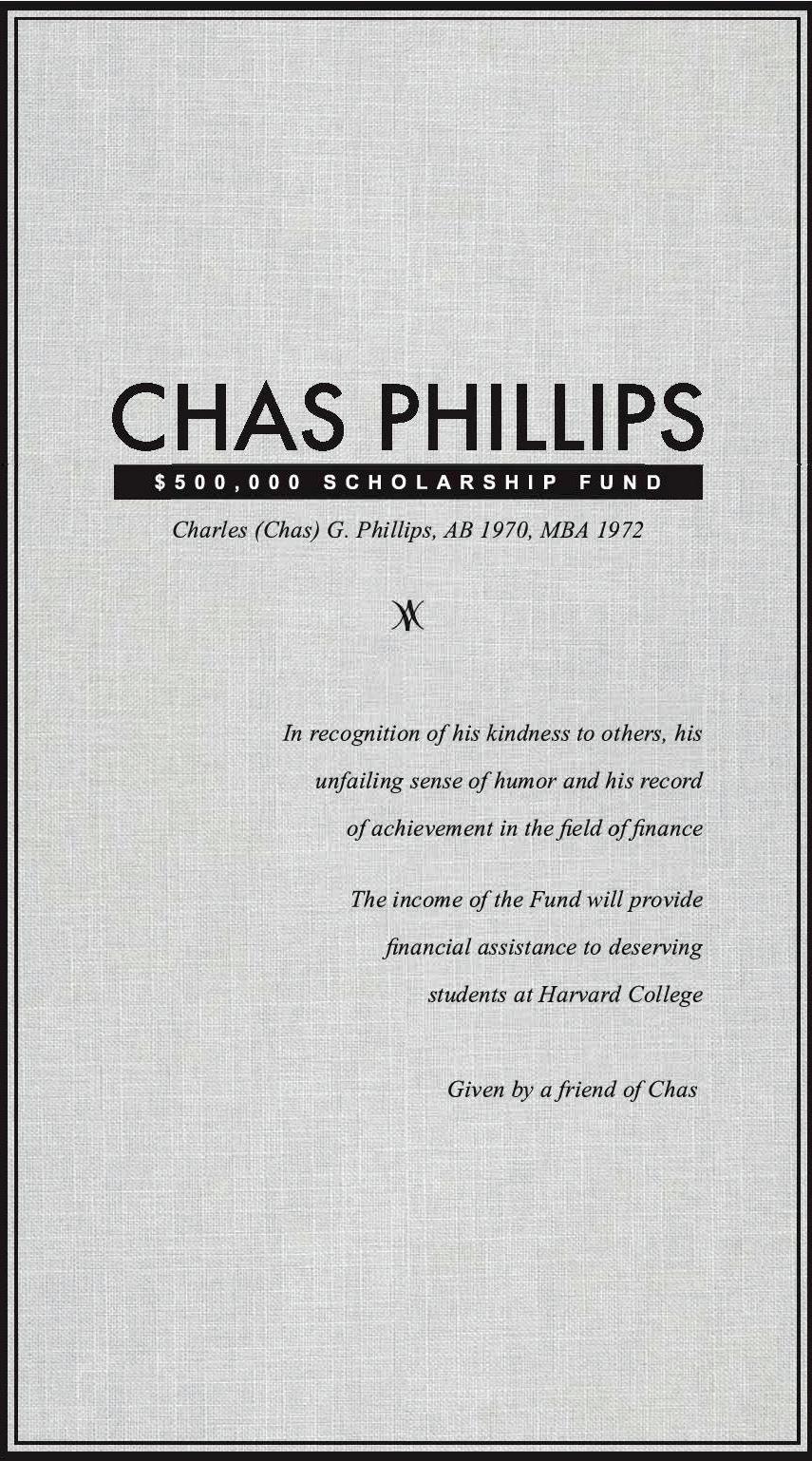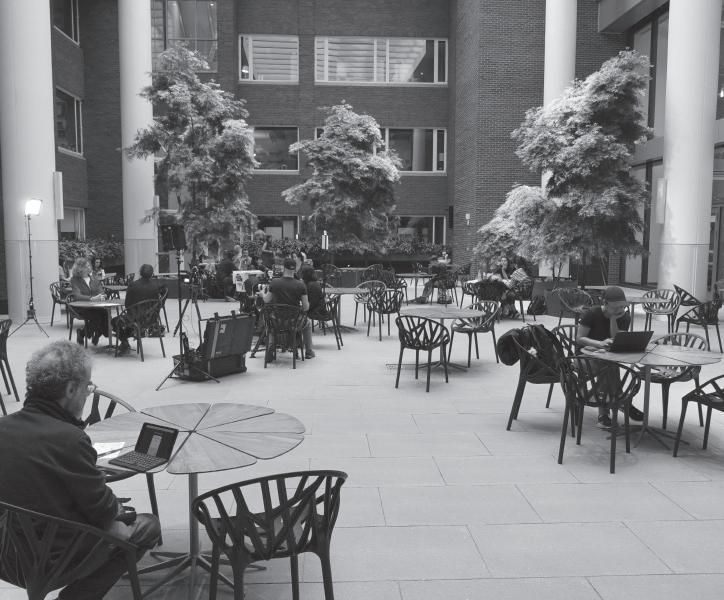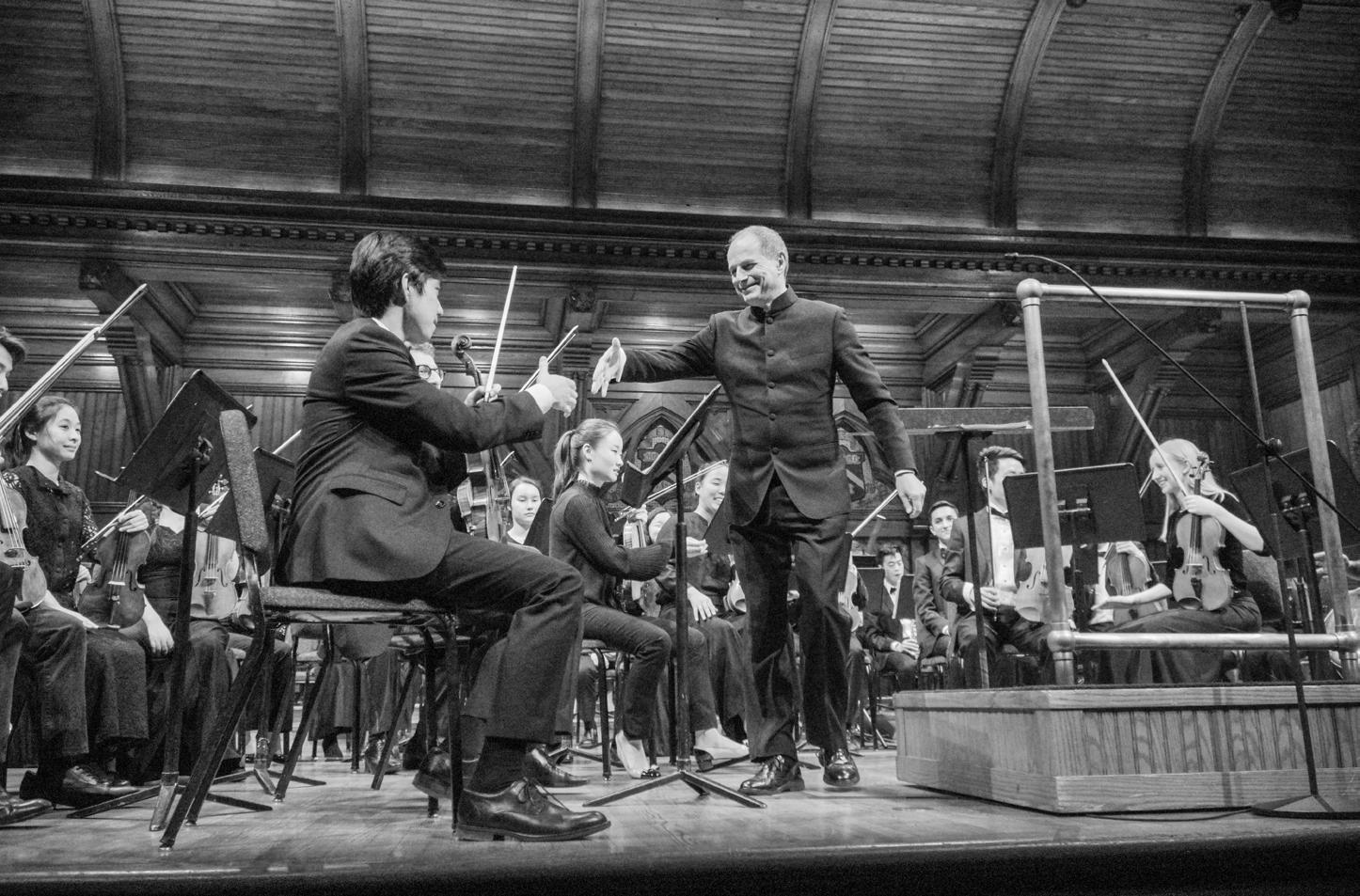
24 minute read
News
Activist Speaks at Design School ‘Womxn’s Week’
Dr. Vandana Shiva, an Indian scholar and environmental activist, spoke at the 2020 International Womxn’s Day Lecture at the Harvard University Graduate School of Design. JONATHAN G. YUAN—CRIMSON PHOTOGRAPHER
By ELIZABETH H, GELLERT and RAQUEL CORONELL URIBE CRIMSON STAFF WRITERS
Physicist and environmental activist Vandana Shiva cautioned against globalization and industrial agriculture while delivering the Harvard Graduate School of Design’s annual International Womxn’s Day keynote lecture Tuesday evening.
The talk featured an introduction by the co-chairs of the Design School’s Womxn in Design group followed by Shiva’s lecture, which was focused on her environmental activism and advocacy.
“If the whole world farmed through biodiversity, if the whole world farmed organically, we could actually reverse climate change,” Shiva said during the talk.
The talk was part of an annual series of International Womxn’s Week events hosted by Womxn in Design. “It’s just a week of celebration,” organizer Vaissnavi Shukl said. “This time we are focusing on kinship and not just limiting kinship to relationships between humans but also relationships between women and the environment, women and soil, women and seeds, and to kind of humanity and other species.”
In her lecture, Shiva encouraged audience members to “celebrate the earth.”
“It’s time to put away the arrogance that some humans are above other humans and that those other humans are superior to other species,” she said. “That’s anthropocentrism. Let’s say bye bye to racism, to sexism, to anthropocentrism, and celebrate the earth.”
Shiva’s talk comes in light of recent controversy after she delivered a different environmental lecture at Stanford on January 23. A letter published in European Scientist condemned Stanford’s decision to invite Shiva because of her use of “anti-scientific rhetoric to support unethical positions.”
An op-ed written by Students for a Sustainable Stanford and published in The Stanford Daily shortly after Shiva’s Stanford talk defended the decision to invite her to speak. The letter cited Shiva’s global recognition and Students for a Sustainable Stanford’s mission to represent people of color and marginalized groups.
Womxn in Design wrote in an emailed statement that it invited Shiva to elevate a dialogue about “relationship between womxn and nature, and between the patriarchy and environmental degradation.”
“This discourse is grossly under-explored at the GSD—but critical in light of womxn’s historical under-representation and marginalization in/through the design fields,” Womxn in Design’s statement reads.
Some attendees of the Harvard talk said they were skeptical of Shiva’s remarks.
“What worries me about her position is that it, and I understand for ideological and political objectives, just over simplifies the situation,” Design School student Nicolas Delgado Alcega said.
In response to Delgado Alcega, Shiva wrote in an emailed statement that she “differentiated between fossil fuel based societies, and societies that function as part of nature’s systems, cycles and biodiversity.”
elizabeth.gellert@thecrimson.com
New ‘HouseCall’ App to Tackle Spread of Disease
By VIRGINIA L. MA CRIMSON STAFF WRITER
Members of Global Alliance for Medical Innovation, a student-run organization, are working to develop a mobile application for symptom reporting to Harvard University Health Services in collaboration with Organismic and Evolutionary Biology professor Pardis C. Sabeti.
The application, called HouseCall, would allow students to report symptoms remotely and receive consultation and treatment in their rooms, rather than going to HUHS. The developers hope this will minimize the spread of infectious diseases on campus.
The application was inspired by recent discoveries by Sabeti’s lab group regarding the 2016- 2017 mumps outbreak on Harvard’s campus. With over 60 confirmed cases, the outbreak served as a reminder of the many spots on campus vulnerable to the spread of infectious diseases, including the HUHS waiting room, Sabeti said.
Global Alliance for Medical Innovation founder Sreekar Mantena ’22 said the goal of the application is to minimize spread of infectious diseases, such as mumps, influenza, and coronavirus.
“Coronavirus, as a respiratory pathogen, is passed on by droplet-based transmission, so being able to limit such an infectious disease pathogen would be really powerful in improving our ability for public health response,” Mantena said.
“With infectious diseases, obviously, once you leave the room you’re in contact with a bunch of peers, students, HUHS members, faculty and that leads to a lot of spread on campus,” he added.
HouseCall would give students a way to report illnesses and receive care, all from the comfort of their bed. After reporting symptoms, a member of HUHS or someone in the House system would receive the report and go to the student’s room to perform a rapid diagnostic test and provide the necessary treatment for the diagnosed illness, Mantena said.
Sabeti said this reporting process would not diminish the amount of information health care practitioners get from a patient.
“Instead of going to the pharmacy to get your medicine, why don’t we bring it to you? And when we bring it to you, why don’t we get more information about your symptoms?” Sabeti said.
Mantena said the group hopes to have the app ready for rollout in three to four weeks.
While the short-term goal is to implement the app in the the Houses, the group hopes to eventually take the framework of HouseCall to other parts of the world, such as West Africa. “When someone feels sick, they can report their symptoms and then a community health worker could come to their house to do a rapid diagnostic test and ensure everything’s okay, give treatment, and especially on a larger scale like on a country scale, being able to track specific cases with geospatial and also diagnostic test data would be really powerful,” Mantena said.
Mantena said the group hopes the implementation of HouseCall on Harvard’s campus can serve as a test run for such broader implementation. “Being able to do a field trial of a system like this at Harvard would be really credible because we have a really great, controlled environment to work in,” he said.
virguinia.ma@thecrimson.com
POLLS FROM PAGE 1
Voters Head to the Polls Across Cambridge, Allston
that former South Bend, Ind. Mayor Peter P.M. Buttigieg ’04 exited the presidential race Sunday night.
At the polls Tuesday, she said she voted for Biden but was not “excited about him.”
“He’s the safest,” she said. “I know pundits that I hear on TV — people who are really staunch republicans — that would vote for Joe Biden.”
At City Hall, voters stirred and made small talk as volunteers dealt with a jammed ballot box.
Cambridge residents from a wide age range don small oval “I Voted!” stickers.
At one point, a woman with a baby strapped to her chest placed a sticker on the baby’s shirt and posed for a selfie.
Maureen C. Ryan, who has lived in Massachusetts for over 30 years, said she voted for U.S. Senator and former Harvard Law School professor Elizabeth Warren (D-Mass.) because she was the most “qualified” person for the job.
Warren cast her own ballot in Cambridge Tuesday morning, her dog Bailey and husband and Law School professor Bruce H. Mann in tow.
“I’ve been following her, listening to her all along her campaign trail,” Ryan said about Warren.
Cambridge resident Kathy R. Weller offered a blunter assessment of the Bay State senator.
Maggie Brown Cambridge Resident
“She’s a badass,” Weller said. “She just cuts through the crap and I really trust her.”
As lines at various polling locations ebbed and flowed Tuesday afternoon, several voters had their eye on the general election.
Sanika S. Mahajan ’21 said she entered a voting booth in Quincy House as a Warren supporter.
After voting, she described the senator as the progressive candidate with the “most actionable plans.”
Mahajan said she thinks voter turnout among youth and minorities is particularly important.
“Young voters and people of color and women showing that they’re going to vote for the Democratic nominee — no matter who it is — in November is so important, even beginning now,” she said.
Eli B. Frankel ’22 said he voted for Sanders with his eye on November turnout.
“I think that the excitement that he energized in people is sufficient to beat Trump in the general election,” Frankel said. Despite bubbling in Biden’s name, Brown said she walked away from the booth with a hint of disillusionment over the remaining Democratic nominees.
“It’s amazing to me that starting off with a diversity of candidates we had, we ended up with all these people in their 70s,” she said.
joshua.fang@thecrimson.com jasper.goodman@thecrimson.com taylor,peterman@thecrimson.com charles.xu@thecrimson.com
Transformative coverage.

The Crimson thecrimson.com
Coronavirus, Enrollment Discussed with Faculty
By JAMES S. BIKALES and KEVIN R. CHEN CRIMSON STAFF WRITERS
Harvard administrators advised professors to prepare contingency plans for teaching and research in response to the continued spread of the novel coronavirus at the Faculty of Arts and Sciences’ monthly meeting Tuesday.
Harvard University Health Services Director Giang T. Nguyen and Dean of the Faculty of Arts and Sciences Claudine Gay both addressed the virus at the meeting.
Nguyen said HUHS is working with administrators, health authorities, and experts across Harvard’s schools to prepare the University for a potential outbreak.
He added that the current situation is “very fluid” and asked faculty to plan for unexpected changes.
Gay asked faculty members to plan solutions to allow teaching and research to continue with minimal interruptions. She suggested that faculty learn to teach using Zoom, a video communication platform.
Harvard restricted all University-related travel to China in early February after the first case of coronavirus in Boston was reported.
Later, the U.S. Centers for Disease Control and Prevention issued Level 3 travel warnings for coronavirus in South Korea, Italy, and Iran, prompting Harvard to add the three countries to its restricted travel list.
Later in the meeting, the faculty discussed a motion to simplify rules for simultaneous course enrollment. Dean of Undergraduate Education Amanda J. Claybaugh submitted the motion on behalf of the Standing Committee on Undergraduate Educational Policy following its review of simultaneous enrollment policies. Currently, FAS allows simultaneous enrollment in one of three circumstances: when one of the course heads agrees to provide “hour-for-hour direct and personal compensatory instruction” for missed class time; when lectures are available on videotape, and a student will miss no more than one-third of them; or when a senior needs both courses to fulfill graduation requirements.
Under all three circumstances, students must submit a petition to the Administrative Board to enroll.
Lawrence S. Bacow University President
Claybaugh said sorting through the hundreds of petitions submitted each semester takes around “300 hours of labor,” causing delays that can prove “stressful” for students. Under the proposed revision, the Standing Committee will grant waivers to courses that meet certain criteria, allowing students to simultaneously enroll in them without petitioning.
In other cases, students still must receive permission from the heads of both courses and petition the Ad Board.
Claybaugh said current procedures do not make sense for courses that upload online lectures and provide other opportunities for in-person instruction.
“I hope these changes will empower faculty to try new, creative teaching methods,” Computer Science professor Stuart M. Shieber, who presented the proposal, said.
Some courses have already been granted waivers from normal simultaneous enrollment rules.
FAS has exempted Computer Science 50: “Introduction to Computer Science” from simultaneous enrollment rules since 2014, while Economics 10: “Principles of Economics” and Statistics 110: “Introduction to Probability” received similar exemptions in 2019.
Also during the meeting, Philosophy chair Edward J. Hall requested an update from University President Lawrence S. Bacow on the Harvard Corporation’s response to fossil fuel divestment. During its February meeting, the faculty voted 179-20 to call on the Corporation — the University’s highest governing body — to divest. “We anticipate that the Corporation, however it responds — we hope positively, given the clarity of the community-wide call for leadership — does so in such a way as to make its reasoning public,” Hall said.
Bacow responded that the Corporation is “aware” of the resolution, but did not have time to substantively consider it in its last meeting, which happened just after the February faculty meeting.
“In the same way it took more than one meeting for this group to discuss the issues, it’s likely to take more than one month for the Corporation to respond as well,” Bacow said.
Bacow pledged to report back to the faculty before the semester’s end.
james.bikales@thecrimson.com kevin.chen@thecrimson.com
WARREN FROM PAGE 1 Warren Casts Her Vote in Cambridge
School.
“I’m not worried,” she said. “I am happy to be part of this democratic process. You know, ten years ago, I was walking here to vote — I was a teacher. I was not any part of this electoral process, other than as a voter.”
Dozens of Harvard students attended Tuesday’s event to rally for Warren. Justin Y. Tseng ’22 said he is “realistic” about Warren’s standing in the race, but added he is still excited about her candidacy.
“She’s the candidate who I trust the most in the White House,” Tseng said.
Attendee Peter L. Laskin ’23 said he was also skeptical of Warren’s ability to make a serious run at the Democratic nomination, but said he preferred her to the other candidates nevertheless.
“I think Biden has more of a lock on the moderate vote and I think Sanders has more of a lock on the progressive vote,” Laskin added. “I think she’s sort of splitting the difference, but it’s not going to be a recipe for success.”
“Do I think she will be the nominee? Probably not, but I like her better than any of the others,” he said.
U.S. Senator Elizabeth Warren (D-Mass.) gathered a crowd as she went to vote Tuesday.
U.S. Senator Elizabeth Warren (D-Mass.) gathered a crowd as she went to vote Tuesday. By Camille G. Caldera
Biden’s campaign has been bolstered in recent days by three high-profile endorsements from ex-rivals. Former South Bend, Ind., Mayor Peter P. M. Buttigieg ’04, U.S. Senator Amy Klobuchar (D-Minn.), and former U.S. Representative Beto O’Rourke have all thrown their support behind Biden as he tries to match Sanders.
“I think that that’s what their politics were all along,” Warren said of the endorsements. “I don’t think there’s anything surprising here, but I do believe the Democratic Party is a progressive party.”
Sarah Katz, a Boston resident who volunteered for Warren’s campaign in Massachusetts and New Hampshire, said it was “insane” to meet her for the first time on Tuesday.
“It was incredible,” she said. “She’s making time for all of us, even though she’s clearly very tired.”
Mann — Warren’s husband of 38 years who walked to vote with her Tuesday alongside their dog, Bailey — said the turnout for Tuesday’s event was “very humbling.”
“We’ve been married a long time and it’s always been an adventure,” he said. “The adventures just keep getting bigger and better.”
jasper.goodman@thecrimson.com
Bacow Supports HUPD Review
and the abolition of the University’s police department at a rally in Harvard Yard.
The protesters demanded an end to the alleged harassment they said they have experienced by Harvard police officers.
When asked about current and former HUPD employees’ lawsuits and filings with the Massachusetts Commission Against Discrimination, Bacow said he believes the filings occurred before his tenure.
“I believe most of those filings, or maybe all of them, occurred well before I became president,” Bacow said.
“I haven’t seen anything that’s been filed recently — or any decisions recently,” he added.
Bacow deferred further questions about the internal review to Executive Vice President Katherine Lapp, who oversees HUPD.
“Katie has a tremendous amount of experience in public safety based upon her experience previously in NYC city government, where the Police and the Fire Department reported to her, and Katie is deeply involved in these issues,” he said.
michelle.kurilla@thecrimson.com ruoqi.zhang@thecrimson.com

The latest on student life.

The Crimson @crimsonflyby
HKS Students Criticize Dean’s Response to Letter
By SIXIAO YU CRIMSON STAFF WRITER
Students at the Harvard Kennedy School criticized their dean’s response to an open letter sent by the HKS Equity Coalition earlier this month advocating for a commitment from the school to “creating a culture and environment built on the principles of anti-racism.”
The original letter sent by the coalition contains three demands: a mandatory course on the history of race and inequality, mandatory diversity training for all Kennedy School affiliates, and cluster hiring of faculty of color who “critically study the intersectionality of race, gender, class, and power.” The letter was signed by multiple affinity groups and 375 Kennedy School affiliates.
In an emailed response to members of the equity coalition, Kennedy School Dean Douglas W. Elmendorf wrote the school is working with the advocacy group Community Change, Inc. to develop anti-racism workshops this spring.
If the process is successful, these workshops will be implemented during new student orientation in the fall, according to Elmendorf’s email.
He wrote that although he and his colleagues are “committed” to adding more courses on race and inequality, they are not yet “convinced” that a “mandatory, standalone course is the best approach.” He also wrote that the school has been working on faculty cluster hiring focused on the stated topics for “several years.”
Several students criticized Elmendorf’s response to the coalition letter in interviews with The Crimson.
Elmendorf did not respond to a request for comment on any of the criticisms.
Nneka O. Onwuzurike, one of the original authors of the coalition letter, called the dean’s response to the three demands “lackluster.”
She cited the absence of student involvement in creating the anti-racism workshops.
“We are not involved in the process of creating solutions to the problems that we, ourselves, have identified to the organization,” she said.
Mike Yepes, a first year at Kennedy School, said he feels Elmendorf misinterpreted what the students meant by a mandatory course focusing on the history of race and inequality.
“We requested a class that catered to talking about oppression and systemic violence across a global context,” Yepes said.
The course did not address this topic, according to Yepes.
In response to Elmendorf’s comment on the process of attracting faculty, Abhinaya Narayanan — another author of the original coalition letter — said while she “recognizes that’s a challenge,” she believes the administration needs to do more to promote an inclusive culture. “If the administration is taking steps to make sure that there are courses in place, that they are recruiting students of color here — we need to make sure that the environment here is one that faculty of color can come to and thrive,” she said.
This has not historically not “been the case,” according to Narayanan.
Sophie P. Dover said the culture at the Kennedy School contributes to its difficulty in attracting faculty.
“What does it say to an applicant when we only have — formerly one, now two — black individuals on tenured faculty? What does it mean or signal to applicants when there is no focus on racist structures within the public policy realm, or the role of colonialism in international affairs?” Dover asked.
“That’s sending clear signaling and messaging to excellent potential faculty who are of Harvard caliber and are going to other schools that are our competitors,” she said.
Onwuzurike cited a simulation that took place in the fall as an example of why she believes the school needs workshops and faculty of color who focus on issues related to diversity and inequality. The simulation was run by white moderators and required first year Masters in Public Policy students to assume roles in a case about police brutality, according to Onwuzurike and three other students interviewed.
“These white teachers and TAs wrote out a fictionalization The Equity Coalition at Harvard Kennedy School drafted a letter advocating for increased diversity within the school’s culture and environment. PEI CHAO ZHUO—CRIMSON PHOTOGRAPHER

of a black man being murdered by the police,” Onwuzurike said.
Onwuzurike was given the role of a “white PhD student who had a lot of racist ideologies in her language,” which made her uncomfortable.
The simulation led several students of color to leave the class, according to Yepes.
“Immediately — like within 10 seconds of reading the prompt — several students of color walked out,” he said. “Multiple others were very uncomfortable and just none of us can fathom how this managed to make it through rounds of reviews to faculty to be given as an assignment for 250 students.”
Course instructors held a “check-in” about the simulation afterwards, according to Yepes. Elmendorf did not respond to a request for comment on the situation.
sixiao.yu@thecrimson.com
CLINIC FROM PAGE 1 HLS Criticized by BGLTQ Group Over New Clinic
Co-Chair Mia Gettenberg said the school did not consult students before that open house.
“As it turned out, HLS had decided to form this clinic primarily in the dark, with no formal process to solicit input from the broader student body or a coalition of student groups,” Deng, Shields, and Gettenberg wrote in a letter to the editor of the Harvard Law Record on Monday.
Students from Lambda — an organization dedicated to serving BGLTQ students on campus — asked Manning at the October open house whether the clinic would avoid cases that abridge the rights of BGTLQ individuals.
The Monday letter to the Harvard Law Record claimed that, at the time, Manning did not provide a clear answer to that question.
“Citing the principle of academic freedom, Dean Manning refused to directly respond to the question,” they wrote in the letter to the editor.
The Law School’s student government passed a resolution unanimously on Nov. 20 calling for increased transparency from Manning regarding the clinic’s scope and whether it would commit to nondiscrimination. The resolution noted the clinic may conduct “important and meaningful work” in support of religious minorities, adding that the Law School should take care to prevent violations of its nondiscrimination policy.
“We believe that if, on the other hand, this clinic takes on cases that impinge on the rights of the LGBTQIA+ community, it would significantly alienate such identifying students of our student body, deter talented individuals from considering Harvard Law, and be a smear on the Harvard Law name nationwide,” the resolution reads.
Also on Nov. 21, Lambda submitted a letter to Manning and the Curriculum Committee in November expressing concerns about the proposed clinic.
The letter, co-signed by 25 other Law School student organizations, asked whether the clinic would work in support of conversion therapy or against abortion clinics.
Students also asked for additional information about the funding and leadership of the clinic.
“Without the guarantee that such a Religious Freedom Clinic would not provide legal services in support of anti-LGBTQ+ and anti-reproductive justice causes, we do not understand how such a clinic could be housed at HLS,” the letter reads. “We are also concerned by the lack of transparency and student engagement surrounding the development of the Religious Freedom Clinic.”
According to Shields, Lambda never received a response from Manning about the letter. Instead, other deans at the Law School reached out to the students to discuss the clinic.
“They were very, very great, but they did not know anything about the clinic, and it just was a conversation of them saying, ‘we don’t know that’ or ‘we don’t know whether we can tell you that,’” Shields said in an interview Monday.
Shields noted Lambda sent a follow-up email asking to meet with Manning, an invitation they said he declined.
On Feb. 26 — the same day the Law School formally announced plans for the clinic — Lambda hosted a public rally and hand-delivered signs protesting the clinic to Manning’s office.
Law School spokesperson Jeff Neal wrote in an emailed statement that Manning has engaged with Lambda students about their concerns, both at the Curriculum Committee open house and in emails with Lambda leadership. He also referenced the Law School’s invitations for Lambda students to meet with various other deans, including Vice Dean for Experiential and Clinical Education Daniel Nagin and Assistant Dean for Clinical and Pro Bono Program Lisa P. Dealy.
“In keeping with the core principles of clinical education at HLS, the new Religious Freedom Clinic will represent underserved and vulnerable clients,” Neal wrote. “It will be designed to be pluralistic and inclusive, and to attract students from across political, ideological, and philosophical perspectives.”
In response to concerns about the clinic’s potential work for discriminatory organizations, Neal wrote that the curriculum would not be at the discretion of the administration.
“The dean does not dictate the case selection of any of the School’s clinical professors or it’s 46 legal clinics and student practice organizations,” he wrote.
The Law School branch of the American Civil Liberties Union — which co-signed the November letter to Manning — reaffirmed its support for Lambda in an emailed statement Tuesday.
“We are troubled by Dean Manning’s refusal to ensure that the clinic will not undermine the rights of the LGBTQ+ community,” Law School student Sara R. Fitzpatrick wrote on behalf of the Harvard Law ACLU. “Religious freedom is a fundamental American right, and it should not be used as a pretext for discriminatory and harmful practices.”
“We are proud to stand with our friends at Lambda to demand that Harvard commit to a clinic that will work for, and not against, civil rights,” she added.
kelsey.griffin@thecrimson.com
PRIMARY FROM PAGE 1
Biden Wins While Warren Takes Third in Mass. Primary
suspended their campaigns and announced they would back the former vice president.
“I think there’s this sense of wanting to — if the number one task is to defeat Donald Trump — coalesce around a candidate,” Massachusetts Democratic strategist Scott Ferson said.
Noah A. Harris ’22, a student from Mississippi who initially supported U.S. Senator Kamala Harris (D-Calif.), said he voted for Biden because he had the “best combination of alignment” with his personal political stance.
“Who I think could beat Donald Trump, that’s what it came down to,” he said.
Rajvir Batra ’22, who also supported Biden, said he was pleasantly surprised by Biden’s success in primaries nationwide.
“I was not expecting this at all,” he said.
Massachusetts voters delivered Warren, a former Harvard Law School professor who has represented the state in the Senate since 2012, a stinging defeat.
Ferson said he thinks the lackluster finish on home turf will likely be “fatal” for Warren. Warren held her only Super Tuesday campaign event in Massachusetts Tuesday morning. Hundreds of enthused supporters lined the streets outside her house in Cambridge to greet her as she went to go cast her ballot at the Graham & Parks School.
“I think it’s very hard for her to go to the next state and make the case for being the strongest candidate to beat Donald Trump,” Ferson said.
Ferson added, though, that he does not view the result as a judgement on Warren’s performance as a senator.
“People like her,” he said. “But when you have a multi-candidate choice, you have to pick one. And I don’t think people viewed this in Massachusetts as a referendum on Warren.”
Before Super Tuesday, polls showed Warren and Sanders in a tight deadlock, with Biden polling far below both progressives. Warren supporters at various Cambridge polling locations pointed to her intellect and policy plans as decisive factors.
“I voted for Elizabeth Warren because I think she’d be the best president,” said Caitlin A. Koseck, a 2016 Harvard Law School graduate. “I’ve really liked her since law school.”
In the Bay State Republican primary, President Donald J. Trump trounced former Massachusetts Governor William F. Weld ’66. Weld — who served as governor of Massachusetts from 1991 to 1997 — received less than 10 percent of the vote early Wednesday morning.
joshua.fang@thecrimson.com jasper.goodman@thecrimson.com
HOUSING FROM PAGE 1
Cambridge City Developers Pledge More Affordable Housing
increase — 79.8 percent — in median single-family home prices in all of Massachusetts, according to the Warren Group, which compiles real estate and financial data.
Christopher Cotter, housing director for the Affordable Trust Fund, said that the Trust Fund is currently looking at new sites and will have more projects to announce in the coming months. “We are talking with developers about moving into the permitting phase of their development timeframe,” he said.
Despite the promises proffered by housing organizations at the meeting, the reception from local residents did not appear universally positive. Valerie A. Bonds, a longtime Cambridge denizen, said she was disheartened by the lack of representation of tenants living in affordable housing Tuesday
“I’m disappointed that there weren’t more representation from the tenant councils, tenant associations, and tenant committees of members who live in affordable housing, whose leadership should be here to speak for us,” she said.
Bonds said she would like to see a representative from those that oversee her building at the tenant council meetings. Michael J. Johnston, executive director of the Cambridge Housing Authority, said his agency has worked to move its portfolio into a Section Eight “project-based portfolio,” referring to the government program that provides housing subsidies to low-income individuals. In the past decade, he said his agency has conducted roughly $500 million worth of work in Cambridge.
“A new world means we have investors,” he said. “We’ve had investors come in and provide us money to basically do the work.”
taylor.peterman@thecrimson.com
Like The Crimson on Facebook.





